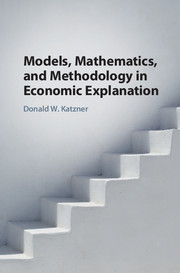Book contents
- Frontmatter
- Dedication
- Contents
- Preface
- Introduction
- 1 Science and Economics
- 2 Economic Models and Explanation
- 3 The Stages of Model Building in Economics
- 4 Models and Mathematics
- 5 Models and Measurement (or Lack Thereof)
- 6 Issues Relating to the Construction of Models from Scratch
- 7 An Example: The Efficiency of Organizational Forms
- 8 The Implicit Assumption Requirements of Later-Stage Model Building
- 9 Ordinality and the Adequacy of Analytic Specification
- 10 Categories of Models
- 11 Conclusion
- Index
1 - Science and Economics
Published online by Cambridge University Press: 26 October 2017
- Frontmatter
- Dedication
- Contents
- Preface
- Introduction
- 1 Science and Economics
- 2 Economic Models and Explanation
- 3 The Stages of Model Building in Economics
- 4 Models and Mathematics
- 5 Models and Measurement (or Lack Thereof)
- 6 Issues Relating to the Construction of Models from Scratch
- 7 An Example: The Efficiency of Organizational Forms
- 8 The Implicit Assumption Requirements of Later-Stage Model Building
- 9 Ordinality and the Adequacy of Analytic Specification
- 10 Categories of Models
- 11 Conclusion
- Index
Summary
Science, as practiced by physicists, chemists, biologists, and other physical scientists, is no doubt one of our most successful and respected intellectual enterprises. Clearly, that success and respect have been intertwined with each other. On the one hand, science is looked up to because of its ability to explain and predict. Science explains the relations and causations that exist between facts and events and the phenomena of the world. That acquired explanation then enables prediction of future events and relations. In actual fact, science has resulted in an enormous extension of, and improvement in, the quality of life that many human beings lead. Medical and biological sciences have provided cures for numerous diseases and adequate food for expanding populations. Other segments of physical science (together with the technological developments they have spawned) have given us central heating, refrigeration, the automobile, plastics, television, the computer, the exploration of space, and much, much more. Thus success has bred respect. On the other hand, respect has brought increased funding into science along with the resources those funds provide, and it has encouraged many individuals to take up science as a career. Respect has therefore resulted in greater support for and the expansion of scientific activity, which, in turn, has brought forth more success. So pervasive and penetrating has been the combination of success and respect that it has led, in some quarters, to the glorification of science. Both those who practice it and scientific work itself are frequently held in the highest esteem. It is no wonder, then, that social science, and especially economics, has often attempted to cloak itself in the mantle of science.
But is social science really science? That, of course, depends on what is meant by the term “science.” Unfortunately, several centuries of philosophical argument have failed to provide an exhaustive and universally accepted prescription that fully characterizes science. Indeed, with the extensive appearance in the middle of the twentieth century of arguments for the abandonment or modification of such comprehensive schemes as positivism and falsificationism, the latter meaning that science is concerned virtually exclusively with the disproof of hypotheses, some philosophers seem to have become content to limit their discussions to describing the properties of “good” science. In this vein, Kincaid [20], for example, while retaining a place for the testing and potential falsification of hypotheses, takes a broader view.
- Type
- Chapter
- Information
- Publisher: Cambridge University PressPrint publication year: 2017



